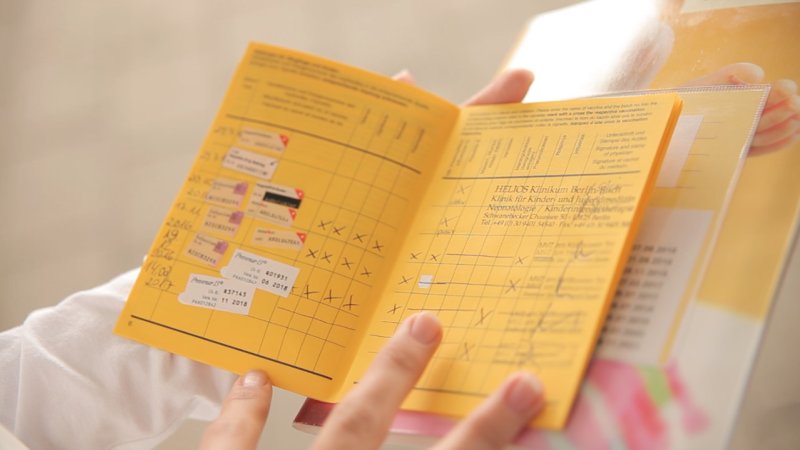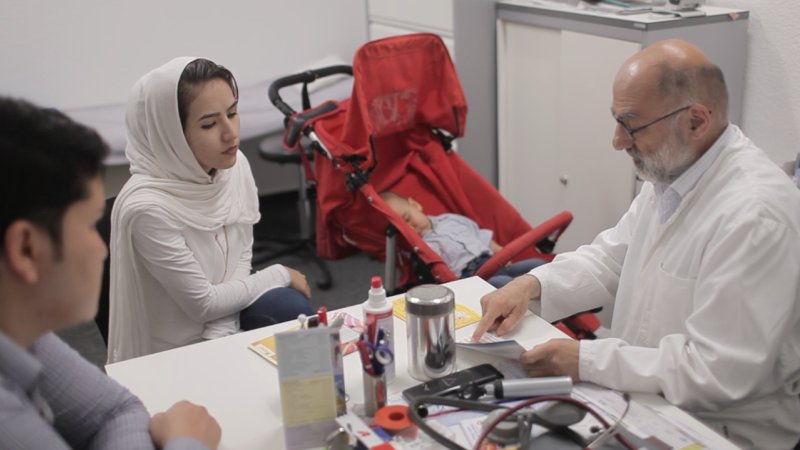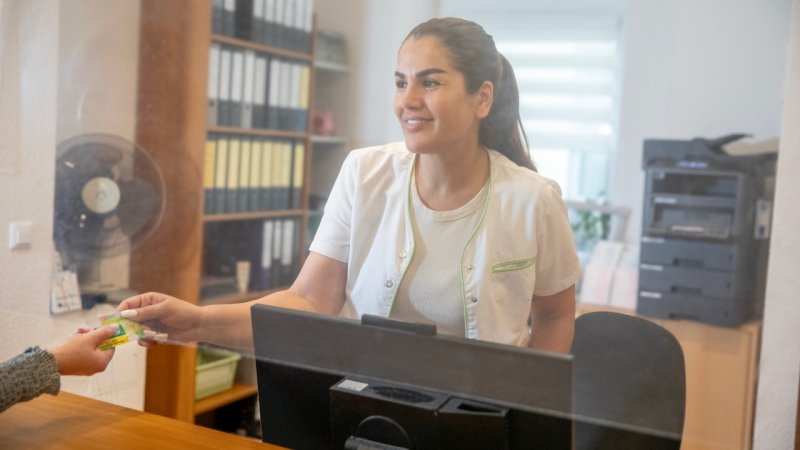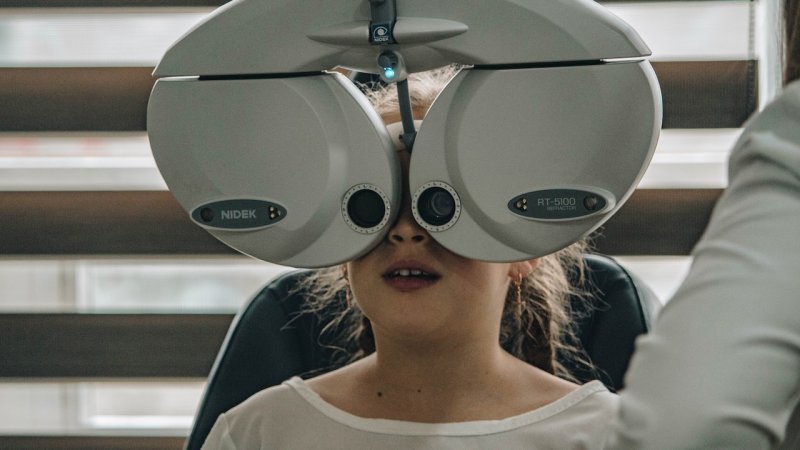
Children can often get sick. Usually, it is nothing serious and the child recovers soon. But children can also contract serious diseases. To ensure your children are well protected against such serious diseases, you can have them child vaccinated. Vaccination will prevent your child from contracting certain diseases or becoming seriously ill if they catch them. Like the U-Checkups, there is a schedule based on which your child needs to receive each vaccine at a certain age. You can learn more about the U-Checkups in our chapter "Health Checks for Children and Adolescents".
Vaccination will prevent your child from contracting certain diseases or becoming seriously ill if they catch them. These are diseases such as whooping cough or measles. To be fully protected against some diseases, your child needs two doses of vaccine. Furthermore, the effects of some vaccines wear off over time, so after a certain period, they need to be refreshed; that means your child will need a second dose. According to the research conducted by the specialists at the Standing Vaccination Commission, your child must receive certain vaccines at certain ages to become immune to diseases.
All vaccinations in the section "When should my child have which vaccine?" are free. The costs are covered by health insurance or the Social Welfare Office.
In Germany, vaccination against certain diseases is compulsory. That means that your child must be vaccinated against specific diseases to be able to attend daycare or school. Currently, vaccination against measles is the only compulsory vaccination (as of 2022), so you do not have to have your child vaccinated against other diseases. Nevertheless, keep in mind that you can protect your child against many (other) diseases with vaccination. You can read more in the section "Why should I have my child vaccinated?".
You can have your child vaccinated at your paediatrician's office. If you do not yet have a paediatric practice for your child, you can search for one nearby on the National Association of Statutory Health Insurance Physicians' website. You first need to select your state and then, click on "Erweiterte Suche". You can also search there for doctors who speak your language.
The doctors record the vaccinations on the vaccination card. With the first vaccination, you will receive a vaccination card for your child free of charge. If you lose it, you can ask your child's paediatrician for a new card.
If you or your child do not speak German well enough to communicate with your paediatrician, you can bring an interpreter with you, for instance, a friend or acquaintance of yours. Alternatively, you can use the services of a professional interpreter.
However, if you are covered by statutory health insurance, you must bear the costs for professional interpreters yourself. If you cannot afford it, try getting help from a volunteer interpreter. The Youth Migration Service staff can help you find a volunteer interpreter. The staff speak various languages. You can find a Youth Migration Service in your area at jugendmigrationsdienste.de.
If you receive benefits under the Asylum Seekers Benefits Act, the Social Welfare Office can cover the costs. It is best to ask at a local counselling centre. The staff can also support you with the application. You can find a counselling centre nearby on the Pro Asyl website.
Please note: you can also search for paediatricians who speak your language on the website of the National Association of Statutory Health Insurance Physicians. To do so, first, select your federal state and then click on "Erweiterte Suche". There, you can search specifically for doctors who speak your language.
Vaccination will prevent your child from contracting certain diseases or becoming seriously ill if they catch them. Like the U-Checkups, there is a schedule for the age when your child needs to receive each vaccine. Because children can get some diseases only at a certain age. You can learn more about the U-Checkups in our chapter "Health Checks for Children and Adolescents".
When your child is 2 months old, you should have them vaccinated against the following diseases:
- Tetanus
- Diphtheria
- Whooping cough
- Hib
- Poliomyelitis
- Hepatitis B
- Pneumococci
You must have your child vaccinated four times against these diseases. This is the only way for your child to have full protection against the diseases mentioned above.
The other appointments will take place when your child is:
- 3 months,
- 4 months and
- 11 to 14 months old.
You can have your child vaccinated at a paediatric practice. To do so, you need to make an appointment.
You should have your child vaccinated against rotavirus up to the 4th month after birth. In addition, it gets 2-3 oral vaccinations.
You can have your child vaccinated at a paediatric practice. To do so, you need to make an appointment.
When your child is between 11 and 14 months old, you should have your child vaccinated against the following diseases:
- Measles
- Mumps
- Rubella
- Chickenpox
For your child to have full protection against these diseases, you must have them vaccinated again when they are between 15 and 23 months old.
It should also be vaccinated against meningococci C. However, the child can also have this vaccine when 15 to 23 months old.
You can have your child vaccinated at a paediatric practice. To do so, you need to make an appointment.
When your child is between 5 and 6 years old, you should renew the vaccination against tetanus, diphtheria and whooping cough since the effect of these vaccines wear off after a certain time.
You can have your child vaccinated at a paediatric practice. To do so, you need to make an appointment.
Between the ages of 9 and 18, your child should be re-vaccinated against tetanus, diphtheria, whooping cough and polio since the effect of these vaccines wear off after a certain time. Doctors also recommend that your child get vaccinated against human papillomavirus (HPV) at this age. It is best to discuss this with your paediatrician. You can also make an appointment for the vaccination there.
Are you unsure when your child needs which vaccination? All recommended vaccinations are listed in the vaccination calendar published by the Robert Koch Institute. The calendar is available in many languages for free download.
Here you can find multilingual, illustrated information about body parts, common illnesses and symptoms - you can use it to better communicate with your doctor.
"Elterntelefon" provides cost-free anonymous counselling for parents in Germany in various languages.
The recommendations of the permanent vaccination commission, STIKO, of the Robert Koch Institute is available in 21 languages.
The counselling centres of the Youth Migration Service (JMD) offer support and advice to refugees and migrants under the age of 27 on various topics in different languages.




